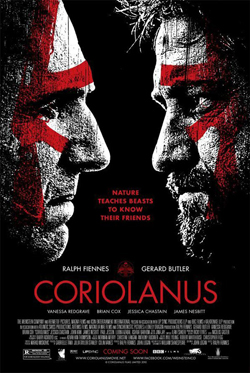LFF 2011: Coriolanus ***
 Part The Hurt Locker meets Shakespearean war documentary, debut director Ralph Fiennes thrashes out the sound of conflict with a war of words in his cinema adaptation of his acclaimed stage play, and the British bard’s tragedy, Coriolanus.
Part The Hurt Locker meets Shakespearean war documentary, debut director Ralph Fiennes thrashes out the sound of conflict with a war of words in his cinema adaptation of his acclaimed stage play, and the British bard’s tragedy, Coriolanus.
Refusing to pander to popular rule and the wishes of his dominant mother, Volumnia (Vanessa Redgrave), celebrated Roman general and war veteran Caius Marcius Coriolanus (Fiennes) is thus banished from Rome and takes his revenge on the city by siding with his sworn enemy, the Volscian army, led by Tullus Aufidius (Gerard Butler). Fearing for the destruction of Rome, the failed politicians send Volumnia and his wife, Virgilia (Jessica Chastain), and son to plead with Coriolanus. His mother succeeds, and Coriolanus returns to the Volscian to declare a treaty between the two sides, only for Aufidius’s men to kill Coriolanus for his betrayal.
Coriolanus has been played by such greats as Laurence Olivier, Richard Burton and Ian McKellen, but with his resounding success on stage in close friend Jonathan Kent’s production at the Almeida in 2000, Fiennes is the obvious fit in the film’s lead role, having already made the part his own and knowing it inside out. Again, the usually shy and nervous actor draws out such power and pose, reaching into his darker being like a Shakespearean Voldermort, that you cannot help but watch him in awe. He injects such focused meaning into the Shakespearean word adapted by John Logan that it becomes a visual weapon itself, rather than the result of the words spoken alone.
However, much as the contemporary setting is fitting for the volatility, what with instability in and popular discontent with government in Eastern Europe and the Baltic region, there is still an sizable element of adjustment as you try to marry the war-torn combat imagery with the older verse. This might leave some alienated and playing catch-up with the storyline – or worse still, turn the viewer off completely, after being lured by the big names. Again, those resigned to letting the power of the word and general ideals of populist revolution rise to the surface will find this enthralling.
In addition to Fiennes, some British acting elite helps turn this into a cinematic gold. Redgrave gives one of her career-defining performances in the harrowing mother-son confrontation scene. Butler growls and dominates the frame, drawing on his battle-hardened 300 characteristics once more to thrill fans. The only rather odd factor is a brief on-screen news report from Channel 4’s Jon Snow that feels totally out of context in the contemporary Roman/The Balkans environment.
In conclusion, Fiennes brings Shakespearean passion to the masses, reiterating that the Bard’s word is still as relevant in today’s politics as it was back in the 17th Century. Coriolanus roars its way into cinemas with full gusto and without taking any prisoners – like witnessing Fiennes going into thespian battle.
3/5 stars
By @FilmGazer